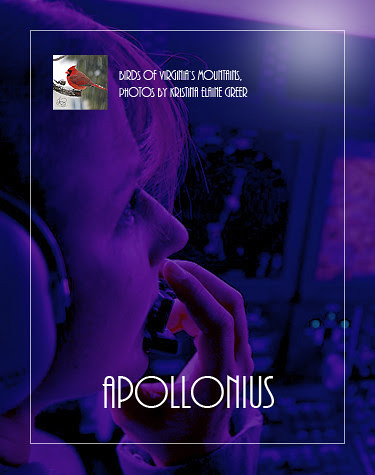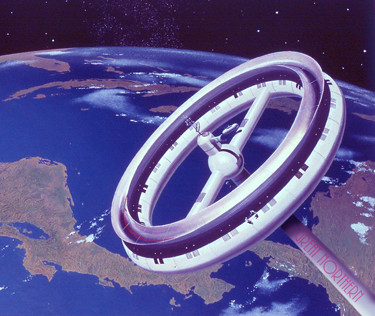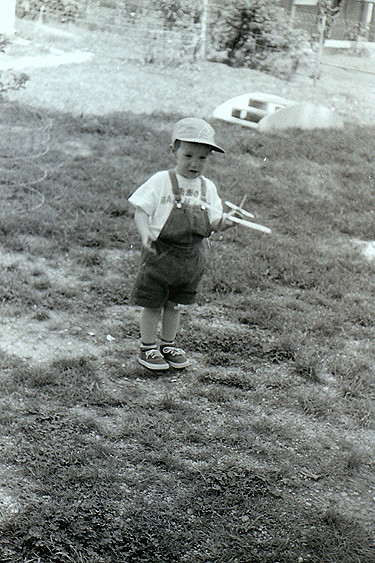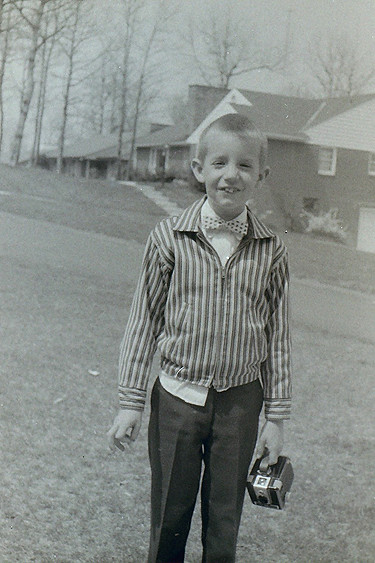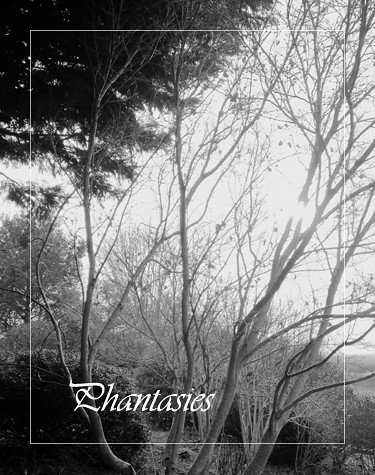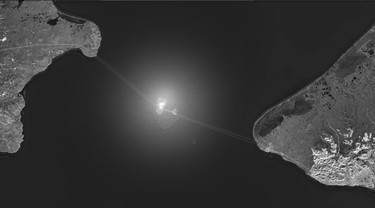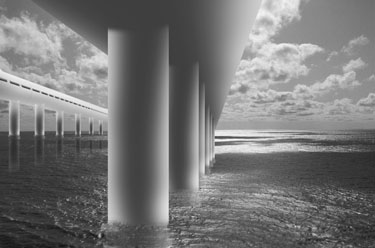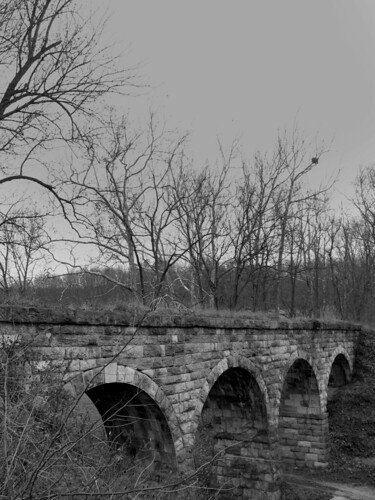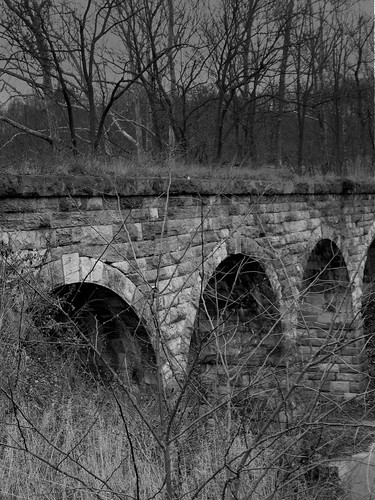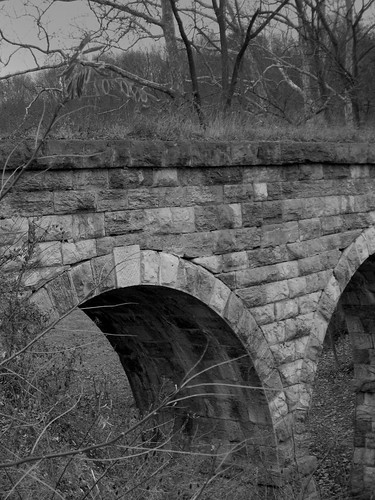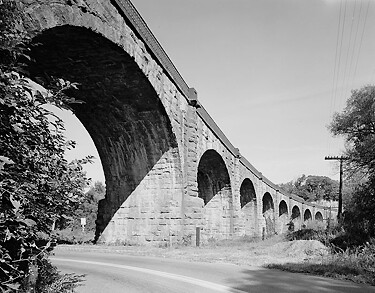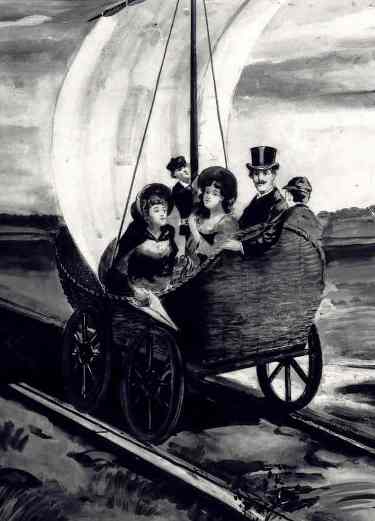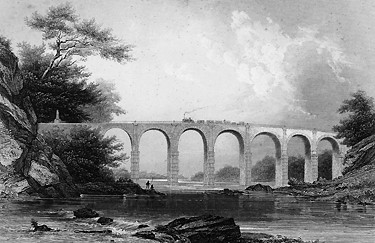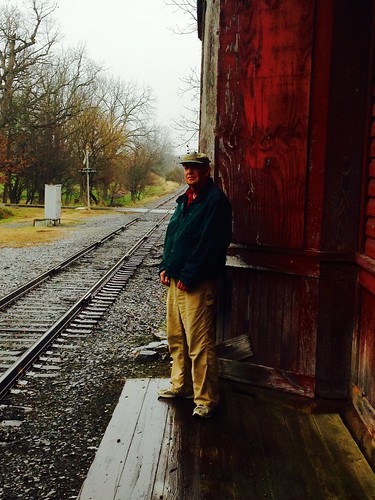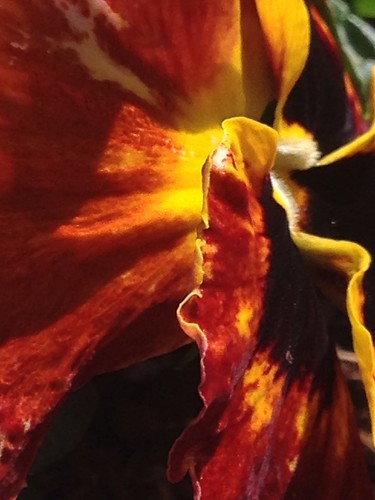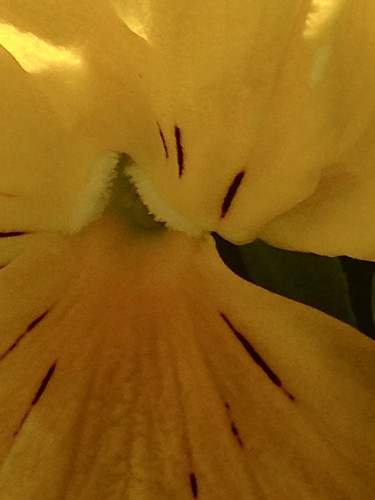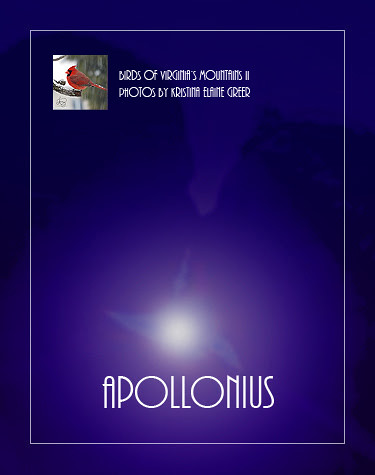
Volume XVI, Issue IX
Apollonius
By Bob Kirchman
Copyright © 2019, The Kirchman Studio, all rights reserved
Chapter 4: Apollonius Takes Charge
In the endless light of the midnight sun the supplying of Great Northern from linear induction shuttles proceeded round the clock. Soon the voyage would begin. Cohen and Ben Gurion shuttled down to meet with Zimmerman. A plan was laid out for command of the Great Northern and oversight of the colonists on board. Once shuttled to the Martian surface, the colony would be administered by the Alaska Autonimous Republic and Israel, but there would be no official presence of either nation there. Because AAR/Israel operated the only ship capable of supplying the colony, this would be enforceable from Earth. Should the colony divert from the agreed upon mission and somehow challenge this chain of command, supply by Great Northern could be suspended. If, as Apollonius had hinted, there were great resources to be found beneath the planet’s surface, the mining off them might finance additional long-distance ships and allow for annual and then twice-yearly visits and departures. George Apollonius might have detested the added oversight over the mission but he was gracious as he nodded to it. Soon the craft would be underway and he would be pretty much in charge of everything anyway. The crew would be busied by the operation of the ship and the colonists would be under his leadership as they traveled outward. Finally, Apollonius came aboard on the last Earth shuttle. He and 29 colonists made up the passenger manifest as the Zimmerman Organization had exercised no hesitation in disqualifying those it felt it needed to. That number could be shuttled down to the Martian surface in the ten Mars shuttles she carried. These craft would remain on the planet. Should an emergency force evacuation of the planet, all the colonists could take off in these craft and with emergency rationing in place, make it back to Earth orbit if need be. Future missions would add more ‘lifeboat’ craft to the colony.
George Apollonius took up residence in the VIP suite, the only quarters that came close to being spacious on the craft. The other 29 colonists were still crowded, though there were empty bunks. The chief surgeon and the engineers for the colony had slightly larger quarters but the cramped nature of the compartments brought to mind ocean voyages in sailing ships. The nine crewmen who would remain on Great Northern had slightly larger cabins than the higher ranking colonists. Due to the staggering of hours on duty, each crew member occupied a single cabin but because all but one were married, the couples enjoyed the luxury of a two-room suite apiece. There were ten crew cabins and a wardroom where the crew would take their meals, watch movies, read and enjoy large-screen Skype conversation with family and friends on Earth. Exercise could be had on some equipment there as well and all of the crew used the gravity ring as a sort of perpetual track for running. Apollonius rarely left his cabin. He was the oldest person on board but the colonists knew that he would be governor of the new settlement and pretty much deferred to his commands.
The settlers were a rather raggedy lot, some prisoners taking up the offer of land and a future in a new world, some were adventure seekers who possessed skills needed for the venture. Others seemed to be of a quiet mysterious sort. They had skills, of course, but they seemed to fit some profile set by Apollonius himself. The selection process in the end rather resembled final jury selection for a drug trial. Zimmerman and Apollonius faced off like prosecution attorney and defense attorney and took turns questioning the final pool of applicants. Elizabeth O’Malley and Hannah were always at Rupert’s side. He requested that, knowing that in the combined pool of their insight he probably would have not agreed so readily to the mission in the first place. In the name of ‘diversity’ or in claims of potential ineptitude, team Zimmerman was able to reduce substantially the number of people suspected of being Apollonius stooges. Still, in the end there was a small group that they noted Cohen and Ben Gurion should watch closely. Twenty-nine men and women and Apollonius would initially man the Mars station. Though they could have sent fifty cramped in the initial voyage, it was remembered that the Great Lake freighters could be operated quite smoothly with a crew of thirty or less. Crewmen would perform varied functions as needed and could be trained to do other functions en route. When cabin fever rose to a head, a crew this size could blow off steam with a few fights and life would settle down again. Full-blown mutiny was unlikely.
Zimmerman and Ben Gurion did not fail to consider the possibility, however, that Apollonius might have some reason in his mind to take over the ship. He was a smooth persuader as he had been on Earth, using his fortune to influence the leadership of the world. It was clear to everyone that this was ‘his’ colony on Mars. The Federalism of AAR and Israel would not quibble with that. All of the colonists were duly warned/informed of this. Apollonius’s Billions were funding the venture so essentially the creepy old billionaire was ‘buying’ the first house on Mars. The Zimmermans doubted it would ever become a colony of 40,000 souls, however, and Cohen and Ben Gurion would still have the honor of first setting foot on the Martian surface. They would lay no claim, rather the colony would be like the bases of exploration in Antarctica… operated by their respective countries but on soil that was considered open to all mankind. Research would be done, resources would be sought. It was like the beginning of a new Century of exploration but the reality was that Sixteenth Century explorers had found ready access to the new world’s treasure. Mars would not likely offer such opportunities. Cohen and Ben Gurion, once they had established that it was safe, would return to Great Northern and the colonists themselves, who would train en route, would monitor their one-way descent to the ‘new colony.’
Abiyah told Sarah that she should go down the ladder first and be like Neil Armstrong in the history books. “It’s not likely you’ll meet a bear or anything down there, and you’ll have one whale of a story to tell the grandkids someday!”
You are too modest, Abiyah!” She responded, recounting many of the heroic man’s past achievements and victories.
Yes, but in the realm of great exploits,” Ben Gurion continued, “You need to catch up with me.”
Alright then, we’ll jump down together.” Sarah said dreamily. “That would be so romantic. History would say we touched a new world together, husband and wife!”
If I don’t push you first!”
(to be continued)
____________________________________________
Birds of Virginia's Mountains by Laney Greer
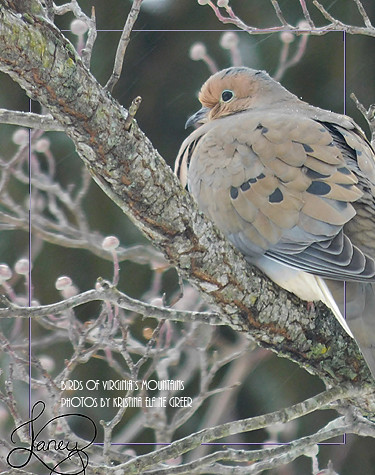
Volume XVI, Issue IXa
Birds in the Virginia Mountains
[click to read]
Photos by Kristina Elaine Greer [1.]
Kristina Elaine (Laney) Greer is an artist in Selma, Virginia, up in the Alleghany Mountains. She was my studio assistant when she was in college and she now has her own studio; Laney’s Palette [click to visit]. In addition to creating her beautiful paintings and murals, Laney is also a photographer. These are some photos of the birds around her home which were a very lovely gift to us! (read more)
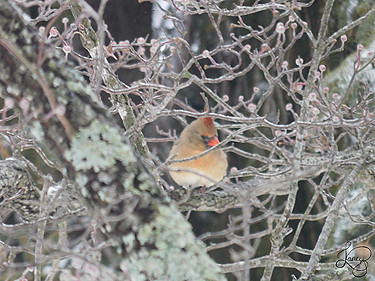
Female Northern Cardinal. Photo by Kristina Elaine Greer.
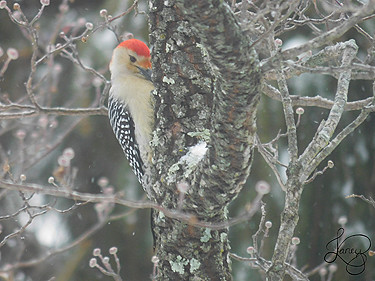
Red-Bellied Woodpecker. Photo by Kristina Elaine Greer.
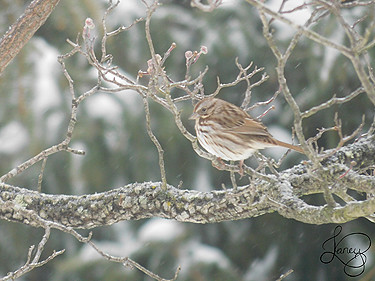
House Sparrow. Photo by Kristina Elaine Greer.
Look at the birds of the air, that they do not sow, neither do they reap, nor gather into barns, and yet your heavenly Father feeds them. Are you not worth much more than they?” – Matthew 6:26
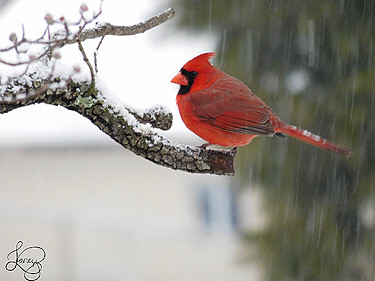
Northern Cardinal (Male). Photo by Kristina Elaine Greer.
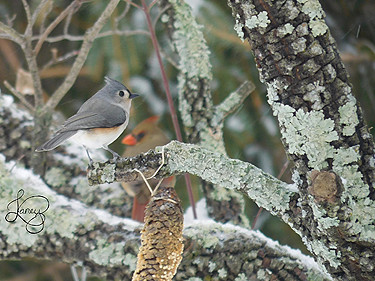
Tufted Titmouse. Photo by Kristina Elaine Greer.
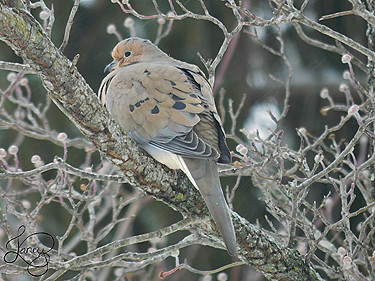
Mourning Dove. Photo by Kristina Elaine Greer.
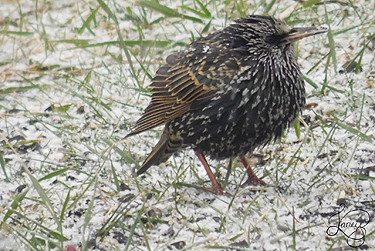
European Starling (puffed in the cold). Photo by Kristina Elaine Greer.
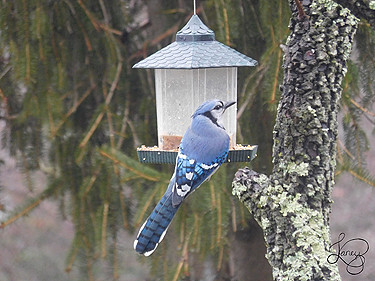
Blue Jay. Photo by Kristina Elaine Greer.
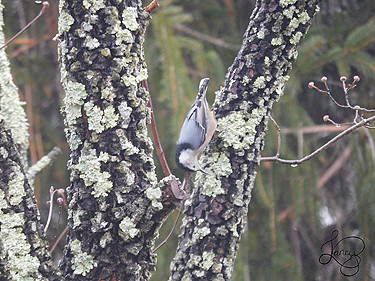
White-Breasted Nuthatch. Photo by Kristina Elaine Greer.
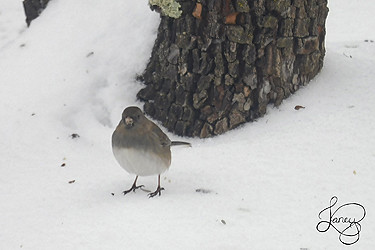
Dark-Eyed Junco (Female). Photo by Kristina Elaine Greer.
When through the woods
And forest glades I wander
And hear the birds
Sing sweetly in the trees
When I look down
From lofty mountain grandeur
And hear the brook
And feel the gentile breeze”
– How Great Thou Art
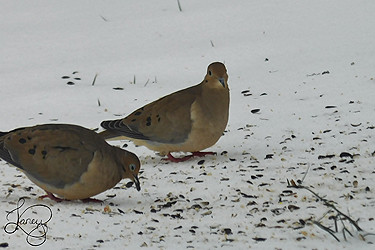
Mourning Doves. Photo by Kristina Elaine Greer.
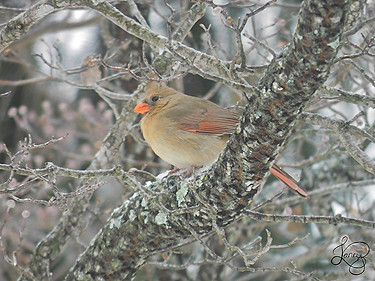
Northern Cardinal (Female). Photo by Kristina Elaine Greer.
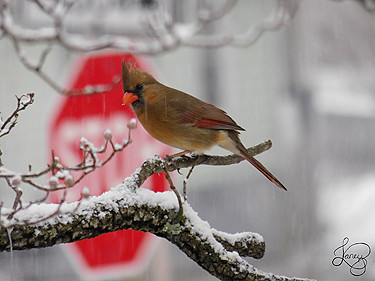
Northern Cardinal (Female). Photo by Kristina Elaine Greer.
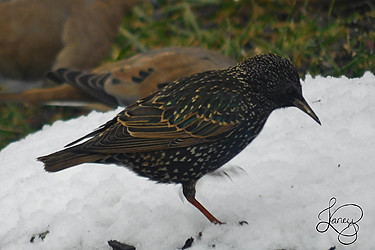
European Starling (Female). Photo by Kristina Elaine Greer.
Birds in the Virginia Mountains
Photos by Kristina Elaine Greer [1.]
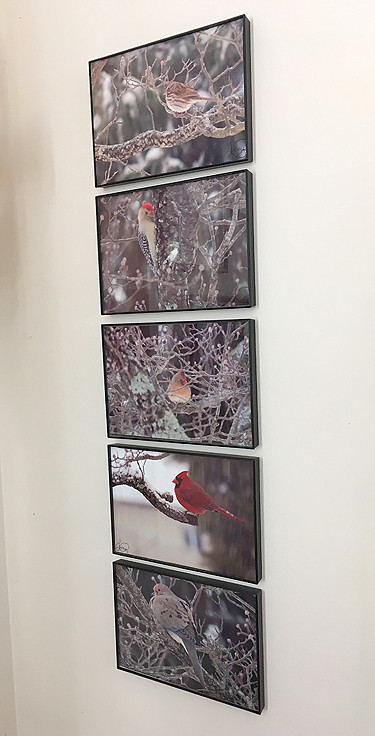
These are 5" x 7" prints of Kristina's photos.
These beautiful 5” x 7” prints of Kristina’s photos are a great addition to the décor of the studio. The house sparrow, red-bellied woodpecker, the female and male Northern cardinals and the mourning dove make a wonderful grouping.
____________________________________________
Who is the Holy Spirit?
What Does the Holy Spirit Do?
Phantasies
By George MacDonald, Chapter 13
I saw a ship sailing upon the sea
Deeply laden as ship could be;
But not so deep as in love I am
For I care not whether I sink or swim."
~ Old Ballad.
But Love is such a Mystery
I cannot find it out:
For when I think I'm best resols'd,
I then am in most doubt."
~ Sir John Suckling.
One story I will try to reproduce. But, alas! it is like trying to reconstruct a forest out of broken branches and withered leaves. In the fairy book, everything was just as it should be, though whether in words or something else, I cannot tell. It glowed and flashed the thoughts upon the soul, with such a power that the medium disappeared from the consciousness, and it was occupied only with the things themselves. My representation of it must resemble a translation from a rich and powerful language, capable of embodying the thoughts of a splendidly developed people, into the meagre and half-articulate speech of a savage tribe. Of course, while I read it, I was Cosmo, and his history was mine. Yet, all the time, I seemed to have a kind of double consciousness, and the story a double meaning. Sometimes it seemed only to represent a simple story of ordinary life, perhaps almost of universal life; wherein two souls, loving each other and longing to come nearer, do, after all, but behold each other as in a glass darkly.
As through the hard rock go the branching silver veins; as into the solid land run the creeks and gulfs from the unresting sea; as the lights and influences of the upper worlds sink silently through the earth's atmosphere; so doth Faerie invade the world of men, and sometimes startle the common eye with an association as of cause and effect, when between the two no connecting links can be traced.
Cosmo von Wehrstahl was a student at the University of Prague. Though of a noble family, he was poor, and prided himself upon the independence that poverty gives; for what will not a man pride himself upon, when he cannot get rid of it? A favourite with his fellow students, he yet had no companions; and none of them had ever crossed the threshold of his lodging in the top of one of the highest houses in the old town. Indeed, the secret of much of that complaisance which recommended him to his fellows, was the thought of his unknown retreat, whither in the evening he could betake himself and indulge undisturbed in his own studies and reveries. These studies, besides those subjects necessary to his course at the University, embraced some less commonly known and approved; for in a secret drawer lay the works of Albertus Magnus and Cornelius Agrippa, along with others less read and more abstruse. As yet, however, he had followed these researches only from curiosity, and had turned them to no practical purpose.
His lodging consisted of one large low-ceiled room, singularly bare of furniture; for besides a couple of wooden chairs, a couch which served for dreaming on both by day and night, and a great press of black oak, there was very little in the room that could be called furniture.
But curious instruments were heaped in the corners; and in one stood a skeleton, half-leaning against the wall, half-supported by a string about its neck. One of its hands, all of fingers, rested on the heavy pommel of a great sword that stood beside it.
Various weapons were scattered about over the floor. The walls were utterly bare of adornment; for the few strange things, such as a large dried bat with wings dispread, the skin of a porcupine, and a stuffed sea-mouse, could hardly be reckoned as such. But although his fancy delighted in vagaries like these, he indulged his imagination with far different fare. His mind had never yet been filled with an absorbing passion; but it lay like a still twilight open to any wind, whether the low breath that wafts but odours, or the storm that bows the great trees till they strain and creak. He saw everything as through a rose-coloured glass. When he looked from his window on the street below, not a maiden passed but she moved as in a story, and drew his thoughts after her till she disappeared in the vista. When he walked in the streets, he always felt as if reading a tale, into which he sought to weave every face of interest that went by; and every sweet voice swept his soul as with the wing of a passing angel. He was in fact a poet without words; the more absorbed and endangered, that the springing-waters were dammed back into his soul, where, finding no utterance, they grew, and swelled, and undermined. He used to lie on his hard couch, and read a tale or a poem, till the book dropped from his hand; but he dreamed on, he knew not whether awake or asleep, until the opposite roof grew upon his sense, and turned golden in the sunrise. Then he arose too; and the impulses of vigorous youth kept him ever active, either in study or in sport, until again the close of the day left him free; and the world of night, which had lain drowned in the cataract of the day, rose up in his soul, with all its stars, and dim-seen phantom shapes. But this could hardly last long. Some one form must sooner or later step within the charmed circle, enter the house of life, and compel the bewildered magician to kneel and worship.
One afternoon, towards dusk, he was wandering dreamily in one of the principal streets, when a fellow student roused him by a slap on the shoulder, and asked him to accompany him into a little back alley to look at some old armour which he had taken a fancy to possess. Cosmo was considered an authority in every matter pertaining to arms, ancient or modern. In the use of weapons, none of the students could come near him; and his practical acquaintance with some had principally contributed to establish his authority in reference to all. He accompanied him willingly.
They entered a narrow alley, and thence a dirty little court, where a low arched door admitted them into a heterogeneous assemblage of everything musty, and dusty, and old, that could well be imagined. His verdict on the armour was satisfactory, and his companion at once concluded the purchase. As they were leaving the place, Cosmo's eye was attracted by an old mirror of an elliptical shape, which leaned against the wall, covered with dust. Around it was some curious carving, which he could see but very indistinctly by the glimmering light which the owner of the shop carried in his hand. It was this carving that attracted his attention; at least so it appeared to him. He left the place, however, with his friend, taking no further notice of it. They walked together to the main street, where they parted and took opposite directions.
No sooner was Cosmo left alone, than the thought of the curious old mirror returned to him. A strong desire to see it more plainly arose within him, and he directed his steps once more towards the shop. The owner opened the door when he knocked, as if he had expected him. He was a little, old, withered man, with a hooked nose, and burning eyes constantly in a slow restless motion, and looking here and there as if after something that eluded them. Pretending to examine several other articles, Cosmo at last approached the mirror, and requested to have it taken down.
Take it down yourself, master; I cannot reach it," said the old man.
Cosmo took it down carefully, when he saw that the carving was indeed delicate and costly, being both of admirable design and execution; containing withal many devices which seemed to embody some meaning to which he had no clue. This, naturally, in one of his tastes and temperament, increased the interest he felt in the old mirror; so much, indeed, that he now longed to possess it, in order to study its frame at his leisure. He pretended, however, to want it only for use; and saying he feared the plate could be of little service, as it was rather old, he brushed away a little of the dust from its face, expecting to see a dull reflection within. His surprise was great when he found the reflection brilliant, revealing a glass not only uninjured by age, but wondrously clear and perfect (should the whole correspond to this part) even for one newly from the hands of the maker. He asked carelessly what the owner wanted for the thing. The old man replied by mentioning a sum of money far beyond the reach of poor Cosmo, who proceeded to replace the mirror where it had stood before.
You think the price too high?" said the old man.
I do not know that it is too much for you to ask," replied Cosmo; "but it is far too much for me to give."
The old man held up his light towards Cosmo's face. "I like your look," said he.
Cosmo could not return the compliment. In fact, now he looked closely at him for the first time, he felt a kind of repugnance to him, mingled with a strange feeling of doubt whether a man or a woman stood before him.
What is your name?" he continued.
Cosmo von Wehrstahl."
Ah, ah! I thought as much. I see your father in you. I knew your father very well, young sir. I dare say in some odd corners of my house, you might find some old things with his crest and cipher upon them still. Well, I like you: you shall have the mirror at the fourth part of what I asked for it; but upon one condition."
What is that?" said Cosmo; for, although the price was still a great deal for him to give, he could just manage it; and the desire to possess the mirror had increased to an altogether unaccountable degree, since it had seemed beyond his reach.
That if you should ever want to get rid of it again, you will let me have the first offer."
Certainly," replied Cosmo, with a smile; adding, "a moderate condition indeed."
On your honour?" insisted the seller.
On my honour," said the buyer; and the bargain was concluded.
I will carry it home for you," said the old man, as Cosmo took it in his hands.
No, no; I will carry it myself," said he; for he had a peculiar dislike to revealing his residence to any one, and more especially to this person, to whom he felt every moment a greater antipathy.
Just as you please," said the old creature, and muttered to himself as he held his light at the door to show him out of the court: "Sold for the sixth time! I wonder what will be the upshot of it this time. I should think my lady had enough of it by now!"
Cosmo carried his prize carefully home. But all the way he had an uncomfortable feeling that he was watched and dogged. Repeatedly he looked about, but saw nothing to justify his suspicions. Indeed, the streets were too crowded and too ill lighted to expose very readily a careful spy, if such there should be at his heels. He reached his lodging in safety, and leaned his purchase against the wall, rather relieved, strong as he was, to be rid of its weight; then, lighting his pipe, threw himself on the couch, and was soon lapt in the folds of one of his haunting dreams.
He returned home earlier than usual the next day, and fixed the mirror to the wall, over the hearth, at one end of his long room.
He then carefully wiped away the dust from its face, and, clear as the water of a sunny spring, the mirror shone out from beneath the envious covering. But his interest was chiefly occupied with the curious carving of the frame. This he cleaned as well as he could with a brush; and then he proceeded to a minute examination of its various parts, in the hope of discovering some index to the intention of the carver. In this, however, he was unsuccessful; and, at length, pausing with some weariness and disappointment, he gazed vacantly for a few moments into the depth of the reflected room. But ere long he said, half aloud: "What a strange thing a mirror is! and what a wondrous affinity exists between it and a man's imagination! For this room of mine, as I behold it in the glass, is the same, and yet not the same. It is not the mere representation of the room I live in, but it looks just as if I were reading about it in a story I like. All its commonness has disappeared. The mirror has lifted it out of the region of fact into the realm of art; and the very representing of it to me has clothed with interest that which was otherwise hard and bare; just as one sees with delight upon the stage the representation of a character from which one would escape in life as from something unendurably wearisome. But is it not rather that art rescues nature from the weary and sated regards of our senses, and the degrading injustice of our anxious everyday life, and, appealing to the imagination, which dwells apart, reveals Nature in some degree as she really is, and as she represents herself to the eye of the child, whose every-day life, fearless and unambitious, meets the true import of the wonder-teeming world around him, and rejoices therein without questioning? That skeleton, now--I almost fear it, standing there so still, with eyes only for the unseen, like a watch-tower looking across all the waste of this busy world into the quiet regions of rest beyond. And yet I know every bone and every joint in it as well as my own fist. And that old battle-axe looks as if any moment it might be caught up by a mailed hand, and, borne forth by the mighty arm, go crashing through casque, and skull, and brain, invading the Unknown with yet another bewildered ghost. I should like to live in that room if I could only get into it."
Scarcely had the half-moulded words floated from him, as he stood gazing into the mirror, when, striking him as with a flash of amazement that fixed him in his posture, noiseless and unannounced, glided suddenly through the door into the reflected room, with stately motion, yet reluctant and faltering step, the graceful form of a woman, clothed all in white. Her back only was visible as she walked slowly up to the couch in the further end of the room, on which she laid herself wearily, turning towards him a face of unutterable loveliness, in which suffering, and dislike, and a sense of compulsion, strangely mingled with the beauty. He stood without the power of motion for some moments, with his eyes irrecoverably fixed upon her; and even after he was conscious of the ability to move, he could not summon up courage to turn and look on her, face to face, in the veritable chamber in which he stood. At length, with a sudden effort, in which the exercise of the will was so pure, that it seemed involuntary, he turned his face to the couch. It was vacant. In bewilderment, mingled with terror, he turned again to the mirror: there, on the reflected couch, lay the exquisite lady-form. She lay with closed eyes, whence two large tears were just welling from beneath the veiling lids; still as death, save for the convulsive motion of her bosom.
Cosmo himself could not have described what he felt. His emotions were of a kind that destroyed consciousness, and could never be clearly recalled. He could not help standing yet by the mirror, and keeping his eyes fixed on the lady, though he was painfully aware of his rudeness, and feared every moment that she would open hers, and meet his fixed regard. But he was, ere long, a little relieved; for, after a while, her eyelids slowly rose, and her eyes remained uncovered, but unemployed for a time; and when, at length, they began to wander about the room, as if languidly seeking to make some acquaintance with her environment, they were never directed towards him: it seemed nothing but what was in the mirror could affect her vision; and, therefore, if she saw him at all, it could only be his back, which, of necessity, was turned towards her in the glass. The two figures in the mirror could not meet face to face, except he turned and looked at her, present in his room; and, as she was not there, he concluded that if he were to turn towards the part in his room corresponding to that in which she lay, his reflection would either be invisible to her altogether, or at least it must appear to her to gaze vacantly towards her, and no meeting of the eyes would produce the impression of spiritual proximity. By-and-by her eyes fell upon the skeleton, and he saw her shudder and close them. She did not open them again, but signs of repugnance continued evident on her countenance. Cosmo would have removed the obnoxious thing at once, but he feared to discompose her yet more by the assertion of his presence which the act would involve. So he stood and watched her. The eyelids yet shrouded the eyes, as a costly case the jewels within; the troubled expression gradually faded from the countenance, leaving only a faint sorrow behind; the features settled into an unchanging expression of rest; and by these signs, and the slow regular motion of her breathing, Cosmo knew that she slept. He could now gaze on her without embarrassment. He saw that her figure, dressed in the simplest robe of white, was worthy of her face; and so harmonious, that either the delicately moulded foot, or any finger of the equally delicate hand, was an index to the whole. As she lay, her whole form manifested the relaxation of perfect repose. He gazed till he was weary, and at last seated himself near the new-found shrine, and mechanically took up a book, like one who watches by a sick-bed. But his eyes gathered no thoughts from the page before him. His intellect had been stunned by the bold contradiction, to its face, of all its experience, and now lay passive, without assertion, or speculation, or even conscious astonishment; while his imagination sent one wild dream of blessedness after another coursing through his soul. How long he sat he knew not; but at length he roused himself, rose, and, trembling in every portion of his frame, looked again into the mirror. She was gone. The mirror reflected faithfully what his room presented, and nothing more. It stood there like a golden setting whence the central jewel has been stolen away--like a night-sky without the glory of its stars. She had carried with her all the strangeness of the reflected room. It had sunk to the level of the one without.
But when the first pangs of his disappointment had passed, Cosmo began to comfort himself with the hope that she might return, perhaps the next evening, at the same hour. Resolving that if she did, she should not at least be scared by the hateful skeleton, he removed that and several other articles of questionable appearance into a recess by the side of the hearth, whence they could not possibly cast any reflection into the mirror; and having made his poor room as tidy as he could, sought the solace of the open sky and of a night wind that had begun to blow, for he could not rest where he was. When he returned, somewhat composed, he could hardly prevail with himself to lie down on his bed; for he could not help feeling as if she had lain upon it; and for him to lie there now would be something like sacrilege. However, weariness prevailed; and laying himself on the couch, dressed as he was, he slept till day.
With a beating heart, beating till he could hardly breathe, he stood in dumb hope before the mirror, on the following evening. Again the reflected room shone as through a purple vapour in the gathering twilight. Everything seemed waiting like himself for a coming splendour to glorify its poor earthliness with the presence of a heavenly joy. And just as the room vibrated with the strokes of the neighbouring church bell, announcing the hour of six, in glided the pale beauty, and again laid herself on the couch. Poor Cosmo nearly lost his senses with delight. She was there once more! Her eyes sought the corner where the skeleton had stood, and a faint gleam of satisfaction crossed her face, apparently at seeing it empty. She looked suffering still, but there was less of discomfort expressed in her countenance than there had been the night before. She took more notice of the things about her, and seemed to gaze with some curiosity on the strange apparatus standing here and there in her room. At length, however, drowsiness seemed to overtake her, and again she fell asleep. Resolved not to lose sight of her this time, Cosmo watched the sleeping form. Her slumber was so deep and absorbing that a fascinating repose seemed to pass contagiously from her to him as he gazed upon her; and he started as if from a dream, when the lady moved, and, without opening her eyes, rose, and passed from the room with the gait of a somnambulist.
Cosmo was now in a state of extravagant delight. Most men have a secret treasure somewhere. The miser has his golden hoard; the virtuoso his pet ring; the student his rare book; the poet his favourite haunt; the lover his secret drawer; but Cosmo had a mirror with a lovely lady in it. And now that he knew by the skeleton, that she was affected by the things around her, he had a new object in life: he would turn the bare chamber in the mirror into a room such as no lady need disdain to call her own. This he could effect only by furnishing and adorning his. And Cosmo was poor. Yet he possessed accomplishments that could be turned to account; although, hitherto, he had preferred living on his slender allowance, to increasing his means by what his pride considered unworthy of his rank. He was the best swordsman in the University; and now he offered to give lessons in fencing and similar exercises, to such as chose to pay him well for the trouble. His proposal was heard with surprise by the students; but it was eagerly accepted by many; and soon his instructions were not confined to the richer students, but were anxiously sought by many of the young nobility of Prague and its neighbourhood. So that very soon he had a good deal of money at his command. The first thing he did was to remove his apparatus and oddities into a closet in the room. Then he placed his bed and a few other necessaries on each side of the hearth, and parted them from the rest of the room by two screens of Indian fabric. Then he put an elegant couch for the lady to lie upon, in the corner where his bed had formerly stood; and, by degrees, every day adding some article of luxury, converted it, at length, into a rich boudoir.
Every night, about the same time, the lady entered. The first time she saw the new couch, she started with a half-smile; then her face grew very sad, the tears came to her eyes, and she laid herself upon the couch, and pressed her face into the silken cushions, as if to hide from everything. She took notice of each addition and each change as the work proceeded; and a look of acknowledgment, as if she knew that some one was ministering to her, and was grateful for it, mingled with the constant look of suffering. At length, after she had lain down as usual one evening, her eyes fell upon some paintings with which Cosmo had just finished adorning the walls. She rose, and to his great delight, walked across the room, and proceeded to examine them carefully, testifying much pleasure in her looks as she did so. But again the sorrowful, tearful expression returned, and again she buried her face in the pillows of her couch. Gradually, however, her countenance had grown more composed; much of the suffering manifest on her first appearance had vanished, and a kind of quiet, hopeful expression had taken its place; which, however, frequently gave way to an anxious, troubled look, mingled with something of sympathetic pity.
Meantime, how fared Cosmo? As might be expected in one of his temperament, his interest had blossomed into love, and his love--shall I call it ripened, or--withered into passion. But, alas! he loved a shadow. He could not come near her, could not speak to her, could not hear a sound from those sweet lips, to which his longing eyes would cling like bees to their honey-founts. Ever and anon he sang to himself:
I shall die for love of the maiden;"
and ever he looked again, and died not, though his heart seemed ready to break with intensity of life and longing. And the more he did for her, the more he loved her; and he hoped that, although she never appeared to see him, yet she was pleased to think that one unknown would give his life to her. He tried to comfort himself over his separation from her, by thinking that perhaps some day she would see him and make signs to him, and that would satisfy him; "for," thought he, "is not this all that a loving soul can do to enter into communion with another? Nay, how many who love never come nearer than to behold each other as in a mirror; seem to know and yet never know the inward life; never enter the other soul; and part at last, with but the vaguest notion of the universe on the borders of which they have been hovering for years? If I could but speak to her, and knew that she heard me, I should be satisfied." Once he contemplated painting a picture on the wall, which should, of necessity, convey to the lady a thought of himself; but, though he had some skill with the pencil, he found his hand tremble so much when he began the attempt, that he was forced to give it up. . . .
Who lives, he dies; who dies, he is alive."
One evening, as he stood gazing on his treasure, he thought he saw a faint expression of self-consciousness on her countenance, as if she surmised that passionate eyes were fixed upon her. This grew; till at last the red blood rose over her neck, and cheek, and brow. Cosmo's longing to approach her became almost delirious. This night she was dressed in an evening costume, resplendent with diamonds. This could add nothing to her beauty, but it presented it in a new aspect; enabled her loveliness to make a new manifestation of itself in a new embodiment. For essential beauty is infinite; and, as the soul of Nature needs an endless succession of varied forms to embody her loveliness, countless faces of beauty springing forth, not any two the same, at any one of her heart-throbs; so the individual form needs an infinite change of its environments, to enable it to uncover all the phases of its loveliness. Diamonds glittered from amidst her hair, half hidden in its luxuriance, like stars through dark rain-clouds; and the bracelets on her white arms flashed all the colours of a rainbow of lightnings, as she lifted her snowy hands to cover her burning face. But her beauty shone down all its adornment. "If I might have but one of her feet to kiss," thought Cosmo, "I should be content." Alas! he deceived himself, for passion is never content. Nor did he know that there are two ways out of her enchanted house. But, suddenly, as if the pang had been driven into his heart from without, revealing itself first in pain, and afterwards in definite form, the thought darted into his mind, "She has a lover somewhere. Remembered words of his bring the colour on her face now. I am nowhere to her. She lives in another world all day, and all night, after she leaves me. Why does she come and make me love her, till I, a strong man, am too faint to look upon her more?" He looked again, and her face was pale as a lily. A sorrowful compassion seemed to rebuke the glitter of the restless jewels, and the slow tears rose in her eyes. She left her room sooner this evening than was her wont. Cosmo remained alone, with a feeling as if his bosom had been suddenly left empty and hollow, and the weight of the whole world was crushing in its walls. The next evening, for the first time since she began to come, she came not. And now Cosmo was in wretched plight. Since the thought of a rival had occurred to him, he could not rest for a moment. More than ever he longed to see the lady face to face. He persuaded himself that if he but knew the worst he would be satisfied; for then he could abandon Prague, and find that relief in constant motion, which is the hope of all active minds when invaded by distress. Meantime he waited with unspeakable anxiety for the next night, hoping she would return: but she did not appear. And now he fell really ill. Rallied by his fellow students on his wretched looks, he ceased to attend the lectures. His engagements were neglected. He cared for nothing, The sky, with the great sun in it, was to him a heartless, burning desert. The men and women in the streets were mere puppets, without motives in themselves, or interest to him. He saw them all as on the ever-changing field of a camera obscura. She--she alone and altogether--was his universe, his well of life, his incarnate good. For six evenings she came not. Let his absorbing passion, and the slow fever that was consuming his brain, be his excuse for the resolution which he had taken and begun to execute, before that time had expired. Reasoning with himself, that it must be by some enchantment connected with the mirror, that the form of the lady was to be seen in it, he determined to attempt to turn to account what he had hitherto studied principally from curiosity. "For," said he to himself, "if a spell can force her presence in that glass (and she came unwillingly at first), may not a stronger spell, such as I know, especially with the aid of her half-presence in the mirror, if ever she appears again, compel her living form to come to me here? If I do her wrong, let love be my excuse. I want only to know my doom from her own lips." He never doubted, all the time, that she was a real earthly woman; or, rather, that there was a woman, who, somehow or other, threw this reflection of her form into the magic mirror. He opened his secret drawer, took out his books of magic, lighted his lamp, and read and made notes from midnight till three in the morning, for three successive nights. Then he replaced his books; and the next night went out in quest of the materials necessary for the conjuration. These were not easy to find; for, in love-charms and all incantations of this nature, ingredients are employed scarcely fit to be mentioned, and for the thought even of which, in connexion with her, he could only excuse himself on the score of his bitter need. At length he succeeded in procuring all he required; and on the seventh evening from that on which she had last appeared, he found himself prepared for the exercise of unlawful and tyrannical power. He cleared the centre of the room; stooped and drew a circle of red on the floor, around the spot where he stood; wrote in the four quarters mystical signs, and numbers which were all powers of seven or nine; examined the whole ring carefully, to see that no smallest break had occurred in the circumference; and then rose from his bending posture. As he rose, the church clock struck seven; and, just as she had appeared the first time, reluctant, slow, and stately, glided in the lady. Cosmo trembled; and when, turning, she revealed a countenance worn and wan, as with sickness or inward trouble, he grew faint, and felt as if he dared not proceed. But as he gazed on the face and form, which now possessed his whole soul, to the exclusion of all other joys and griefs, the longing to speak to her, to know that she heard him, to hear from her one word in return, became so unendurable, that he suddenly and hastily resumed his preparations. Stepping carefully from the circle, he put a small brazier into its centre. He then set fire to its contents of charcoal, and while it burned up, opened his window and seated himself, waiting, beside it. It was a sultry evening. The air was full of thunder. A sense of luxurious depression filled the brain. The sky seemed to have grown heavy, and to compress the air beneath it. A kind of purplish tinge pervaded the atmosphere, and through the open window came the scents of the distant fields, which all the vapours of the city could not quench. Soon the charcoal glowed. Cosmo sprinkled upon it the incense and other substances which he had compounded, and, stepping within the circle, turned his face from the brazier and towards the mirror. Then, fixing his eyes upon the face of the lady, he began with a trembling voice to repeat a powerful incantation. He had not gone far, before the lady grew pale; and then, like a returning wave, the blood washed all its banks with its crimson tide, and she hid her face in her hands. Then he passed to a conjuration stronger yet. The lady rose and walked uneasily to and fro in her room. Another spell; and she seemed seeking with her eyes for some object on which they wished to rest. At length it seemed as if she suddenly espied him; for her eyes fixed themselves full and wide upon his, and she drew gradually, and somewhat unwillingly, close to her side of the mirror, just as if his eyes had fascinated her. Cosmo had never seen her so near before. Now at least, eyes met eyes; but he could not quite understand the expression of hers. They were full of tender entreaty, but there was something more that he could not interpret. Though his heart seemed to labour in his throat, he would allow no delight or agitation to turn him from his task. Looking still in her face, he passed on to the mightiest charm he knew. Suddenly the lady turned and walked out of the door of her reflected chamber. A moment after she entered his room with veritable presence; and, forgetting all his precautions, he sprang from the charmed circle, and knelt before her. There she stood, the living lady of his passionate visions, alone beside him, in a thundery twilight, and the glow of a magic fire. "Why," said the lady, with a trembling voice, "didst thou bring a poor maiden through the rainy streets alone?" "Because I am dying for love of thee; but I only brought thee from the mirror there." "Ah, the mirror!" and she looked up at it, and shuddered. "Alas! I am but a slave, while that mirror exists. But do not think it was the power of thy spells that drew me; it was thy longing desire to see me, that beat at the door of my heart, till I was forced to yield." "Canst thou love me then?" said Cosmo, in a voice calm as death, but almost inarticulate with emotion. "I do not know," she replied sadly; "that I cannot tell, so long as I am bewildered with enchantments. It were indeed a joy too great, to lay my head on thy bosom and weep to death; for I think thou lovest me, though I do not know;--but----" Cosmo rose from his knees. "I love thee as--nay, I know not what--for since I have loved thee, there is nothing else." He seized her hand: she withdrew it. "No, better not; I am in thy power, and therefore I may not." She burst into tears, and kneeling before him in her turn, said-- "Cosmo, if thou lovest me, set me free, even from thyself; break the mirror." "And shall I see thyself instead?" "That I cannot tell, I will not deceive thee; we may never meet again." A fierce struggle arose in Cosmo's bosom. Now she was in his power. She did not dislike him at least; and he could see her when he would. To break the mirror would be to destroy his very life to banish out of his universe the only glory it possessed. The whole world would be but a prison, if he annihilated the one window that looked into the paradise of love. Not yet pure in love, he hesitated. With a wail of sorrow the lady rose to her feet. "Ah! he loves me not; he loves me not even as I love him; and alas! I care more for his love than even for the freedom I ask." "I will not wait to be willing," cried Cosmo; and sprang to the corner where the great sword stood. Meantime it had grown very dark; only the embers cast a red glow through the room. He seized the sword by the steel scabbard, and stood before the mirror; but as he heaved a great blow at it with the heavy pommel, the blade slipped half-way out of the scabbard, and the pommel struck the wall above the mirror. At that moment, a terrible clap of thunder seemed to burst in the very room beside them; and ere Cosmo could repeat the blow, he fell senseless on the hearth. When he came to himself, he found that the lady and the mirror had both disappeared. He was seized with a brain fever, which kept him to his couch for weeks. When he recovered his reason, he began to think what could have become of the mirror. For the lady, he hoped she had found her way back as she came; but as the mirror involved her fate with its own, he was more immediately anxious about that. He could not think she had carried it away. It was much too heavy, even if it had not been too firmly fixed in the wall, for her to remove it. Then again, he remembered the thunder; which made him believe that it was not the lightning, but some other blow that had struck him down. He concluded that, either by supernatural agency, he having exposed himself to the vengeance of the demons in leaving the circle of safety, or in some other mode, the mirror had probably found its way back to its former owner; and, horrible to think of, might have been by this time once more disposed of, delivering up the lady into the power of another man; who, if he used his power no worse than he himself had done, might yet give Cosmo abundant cause to curse the selfish indecision which prevented him from shattering the mirror at once. Indeed, to think that she whom he loved, and who had prayed to him for freedom, should be still at the mercy, in some degree, of the possessor of the mirror, and was at least exposed to his constant observation, was in itself enough to madden a chary lover. Anxiety to be well retarded his recovery; but at length he was able to creep abroad. He first made his way to the old broker's, pretending to be in search of something else. A laughing sneer on the creature's face convinced him that he knew all about it; but he could not see it amongst his furniture, or get any information out of him as to what had become of it. He expressed the utmost surprise at hearing it had been stolen, a surprise which Cosmo saw at once to be counterfeited; while, at the same time, he fancied that the old wretch was not at all anxious to have it mistaken for genuine. Full of distress, which he concealed as well as he could, he made many searches, but with no avail. Of course he could ask no questions; but he kept his ears awake for any remotest hint that might set him in a direction of search. He never went out without a short heavy hammer of steel about him, that he might shatter the mirror the moment he was made happy by the sight of his lost treasure, if ever that blessed moment should arrive. Whether he should see the lady again, was now a thought altogether secondary, and postponed to the achievement of her freedom. He wandered here and there, like an anxious ghost, pale and haggard; gnawed ever at the heart, by the thought of what she might be suffering--all from his fault. One night, he mingled with a crowd that filled the rooms of one of the most distinguished mansions in the city; for he accepted every invitation, that he might lose no chance, however poor, of obtaining some information that might expedite his discovery. Here he wandered about, listening to every stray word that he could catch, in the hope of a revelation. As he approached some ladies who were talking quietly in a corner, one said to another: "Have you heard of the strange illness of the Princess von Hohenweiss?" "Yes; she has been ill for more than a year now. It is very sad for so fine a creature to have such a terrible malady. She was better for some weeks lately, but within the last few days the same attacks have returned, apparently accompanied with more suffering than ever. It is altogether an inexplicable story." "Is there a story connected with her illness?" "I have only heard imperfect reports of it; but it is said that she gave offence some eighteen months ago to an old woman who had held an office of trust in the family, and who, after some incoherent threats, disappeared. This peculiar affection followed soon after. But the strangest part of the story is its association with the loss of an antique mirror, which stood in her dressing-room, and of which she constantly made use." Here the speaker's voice sank to a whisper; and Cosmo, although his very soul sat listening in his ears, could hear no more. He trembled too much to dare to address the ladies, even if it had been advisable to expose himself to their curiosity. The name of the Princess was well known to him, but he had never seen her; except indeed it was she, which now he hardly doubted, who had knelt before him on that dreadful night. Fearful of attracting attention, for, from the weak state of his health, he could not recover an appearance of calmness, he made his way to the open air, and reached his lodgings; glad in this, that he at least knew where she lived, although he never dreamed of approaching her openly, even if he should be happy enough to free her from her hateful bondage. He hoped, too, that as he had unexpectedly learned so much, the other and far more important part might be revealed to him ere long.
* * * * * * *
Have you seen Steinwald lately?"
No, I have not seen him for some time. He is almost a match for me at the rapier, and I suppose he thinks he needs no more lessons."
I wonder what has become of him. I want to see him very much. Let me see; the last time I saw him he was coming out of that old broker's den, to which, if you remember, you accompanied me once, to look at some armour. That is fully three weeks ago."
This hint was enough for Cosmo. Von Steinwald was a man of influence in the court, well known for his reckless habits and fierce passions. The very possibility that the mirror should be in his possession was hell itself to Cosmo. But violent or hasty measures of any sort were most unlikely to succeed. All that he wanted was an opportunity of breaking the fatal glass; and to obtain this he must bide his time. He revolved many plans in his mind, but without being able to fix upon any.
At length, one evening, as he was passing the house of Von Steinwald, he saw the windows more than usually brilliant. He watched for a while, and seeing that company began to arrive, hastened home, and dressed as richly as he could, in the hope of mingling with the guests unquestioned: in effecting which, there could be no difficulty for a man of his carriage.
* * * * * * *
In a lofty, silent chamber, in another part of the city, lay a form more like marble than a living woman. The loveliness of death seemed frozen upon her face, for her lips were rigid, and her eyelids closed. Her long white hands were crossed over her breast, and no breathing disturbed their repose. Beside the dead, men speak in whispers, as if the deepest rest of all could be broken by the sound of a living voice. Just so, though the soul was evidently beyond the reach of all intimations from the senses, the two ladies, who sat beside her, spoke in the gentlest tones of subdued sorrow. "She has lain so for an hour."
This cannot last long, I fear."
How much thinner she has grown within the last few weeks! If she would only speak, and explain what she suffers, it would be better for her. I think she has visions in her trances, but nothing can induce her to refer to them when she is awake."
Does she ever speak in these trances?"
I have never heard her; but they say she walks sometimes, and once put the whole household in a terrible fright by disappearing for a whole hour, and returning drenched with rain, and almost dead with exhaustion and fright. But even then she would give no account of what had happened."
A scarce audible murmur from the yet motionless lips of the lady here startled her attendants. After several ineffectual attempts at articulation, the word "Cosmo!" burst from her. Then she lay still as before; but only for a moment. With a wild cry, she sprang from the couch erect on the floor, flung her arms above her head, with clasped and straining hands, and, her wide eyes flashing with light, called aloud, with a voice exultant as that of a spirit bursting from a sepulchre, "I am free! I am free! I thank thee!" Then she flung herself on the couch, and sobbed; then rose, and paced wildly up and down the room, with gestures of mingled delight and anxiety. Then turning to her motionless attendants--"Quick, Lisa, my cloak and hood!" Then lower--"I must go to him. Make haste, Lisa! You may come with me, if you will."
In another moment they were in the street, hurrying along towards one of the bridges over the Moldau. The moon was near the zenith, and the streets were almost empty. The Princess soon outstripped her attendant, and was half-way over the bridge, before the other reached it.
Are you free, lady? The mirror is broken: are you free?"
The words were spoken close beside her, as she hurried on. She turned; and there, leaning on the parapet in a recess of the bridge, stood Cosmo, in a splendid dress, but with a white and quivering face.
Cosmo!--I am free--and thy servant for ever. I was coming to you now."
And I to you, for Death made me bold; but I could get no further. Have I atoned at all? Do I love you a little--truly?"
Ah, I know now that you love me, my Cosmo; but what do you say about death?"
He did not reply. His hand was pressed against his side. She looked more closely: the blood was welling from between the fingers. She flung her arms around him with a faint bitter wail.
When Lisa came up, she found her mistress kneeling above a wan dead face, which smiled on in the spectral moonbeams.
And now I will say no more about these wondrous volumes; though I could tell many a tale out of them, and could, perhaps, vaguely represent some entrancing thoughts of a deeper kind which I found within them. From many a sultry noon till twilight, did I sit in that grand hall, buried and risen again in these old books. And I trust I have carried away in my soul some of the exhalations of their undying leaves. In after hours of deserved or needful sorrow, portions of what I read there have often come to me again, with an unexpected comforting; which was not fruitless, even though the comfort might seem in itself groundless and vain.
(to be continued)
The Lion, the Witch and the Wardrobe
The BBC Production
This 1988 British Broadcasting Corporation production is much truer to the books than the newer films are.
The Wood Between the Worlds
from 'The Magician's Nephew' by C. S. Lewis
Photos by Bob Kirchman
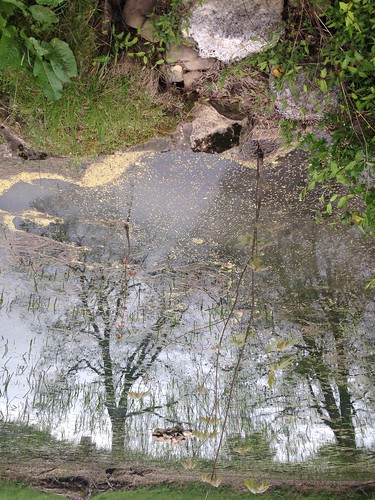
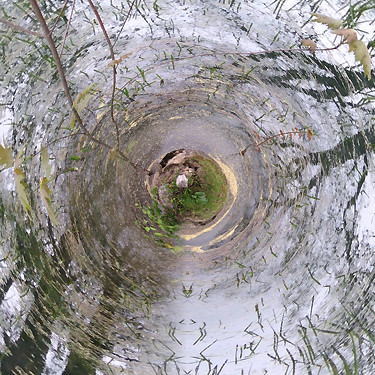
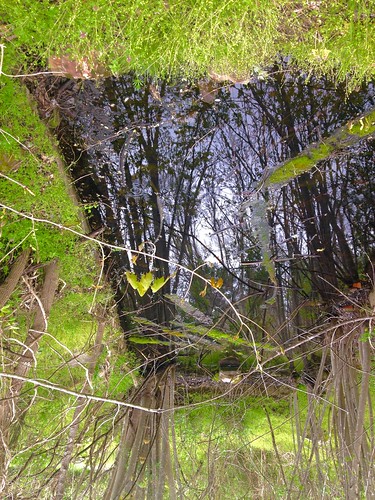
A rainy day in Augusta Wetlands evokes imagery from C. S. Lewis.

